November 15, 2025. Jaja Retreat for Gyeolsa Practitioners and Dharma Teachers, Youth Festival Supporters Disbanding Ceremony
Hello. Morning has dawned at Seoul Jungto Center.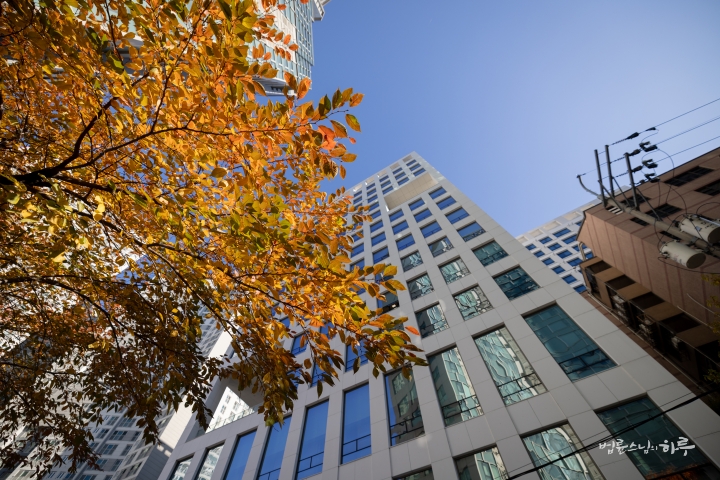
After completing morning practice and meditation, Sunim participated online in the Jaja (自恣) Retreat for Gyeolsa (結社) Practitioners and Dharma Teachers from the broadcasting room at Jungto Center starting at 8 AM. About 110 Gyeolsa Practitioners and Dharma Teachers also gathered at main temples across the country to participate in the day-long Jaja Retreat.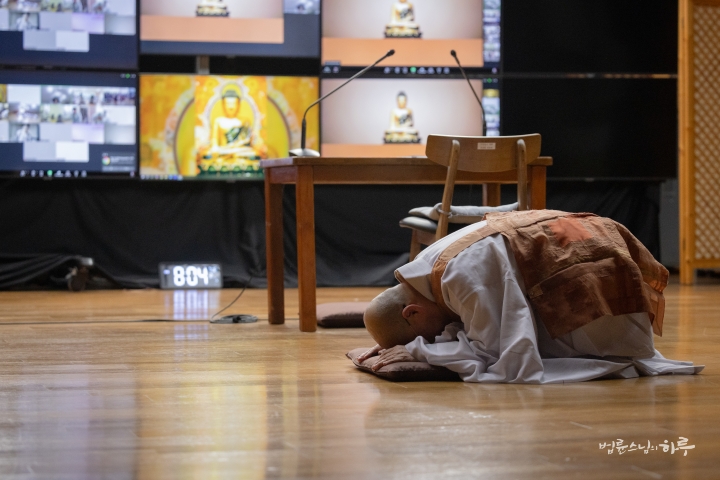
After chanting and reciting the Heart Sutra, the Gyeolsa Practitioners and Dharma Teachers requested an opening Dharma talk from Sunim with three prostrations. Sunim explained in detail why Jungto Society practices ‘Jaja.’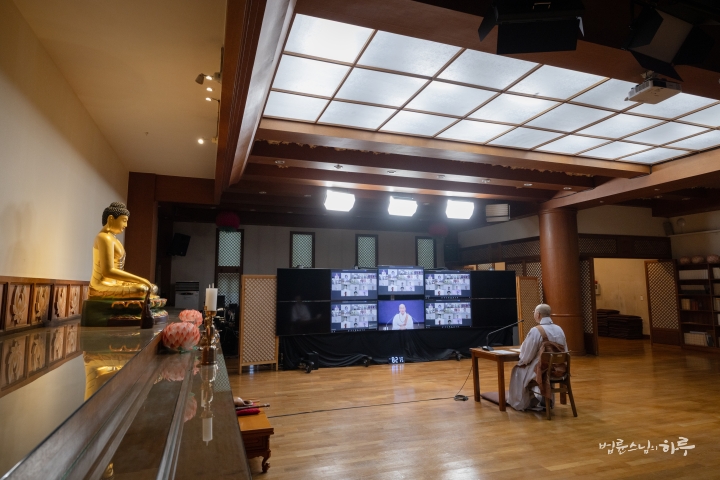
“Common sense would suggest that knowing oneself is easier than knowing others. However, in reality, while knowing others is difficult, knowing oneself is far more challenging. As the saying goes, ‘You may know the depths of a thousand fathoms of water, but not the depths of a single fathom of the human heart.’ This means that just as it’s difficult to know another person’s mind, knowing one’s own mind is even more difficult. Sometimes, others know things about us that we ourselves don’t realize. While it’s understandable that knowing others’ minds is difficult, not properly knowing even our own mind is actually quite contradictory. That’s why the practice Buddha taught us is to be aware of our mind’s state as it is and to free ourselves from suffering, which is the disease of the mind. 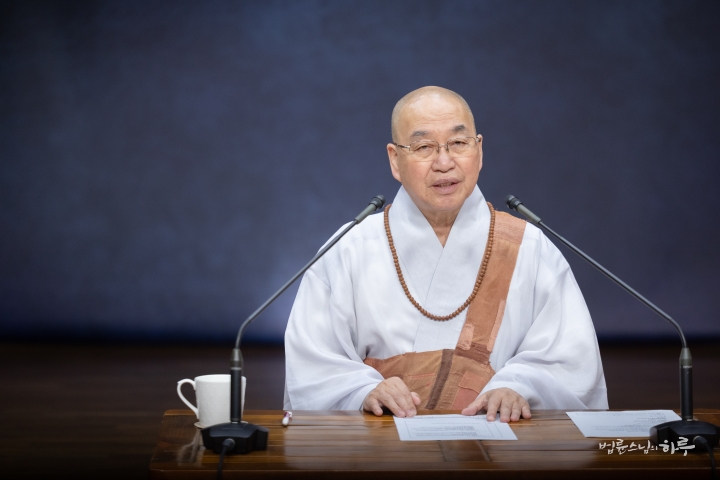
The Path to Healing Through Knowing One’s Mind – Repentance, Posal (布薩) , and Jaja
Knowing one’s own mind is called ‘self-awareness’ (自覺) in Chinese characters. Self-awareness means knowing one’s own mental state. When the mind is contaminated by the three poisons of greed, anger, and ignorance (貪瞋癡), it means recognizing ‘This is the state my mind is in now’ and returning to a pure state. This practice of turning the mind around is called ‘repentance’ (懺悔). Therefore, we must practice repentance daily by examining our own minds. Fundamentally, since ‘ordinary mind is the Way(道),’ we should be aware every moment, but at the very least, we should examine our mental state once a day.
After Buddha’s passing, it was the Sangha that took on Buddha’s role. The Sangha refers not to a single monk but to a community of practitioners. The Sangha can fulfill Buddha’s role only when it maintains pure precepts and harmony as if it were a single entity. However, since we are still in the process of practice and not in a state of moment-to-moment awareness, it’s difficult to recognize all our own faults by ourselves. That’s why Jaja (自恣) is a system where we ask other Sangha members to use their eyes, ears, and wisdom to point out any faults where we failed to maintain purity as practitioners or violated community precepts over the past year.
‘If you see my faults with your wisdom and point them out to me with compassionate hearts for my sake, I will gladly accept them and correct those faults.’ 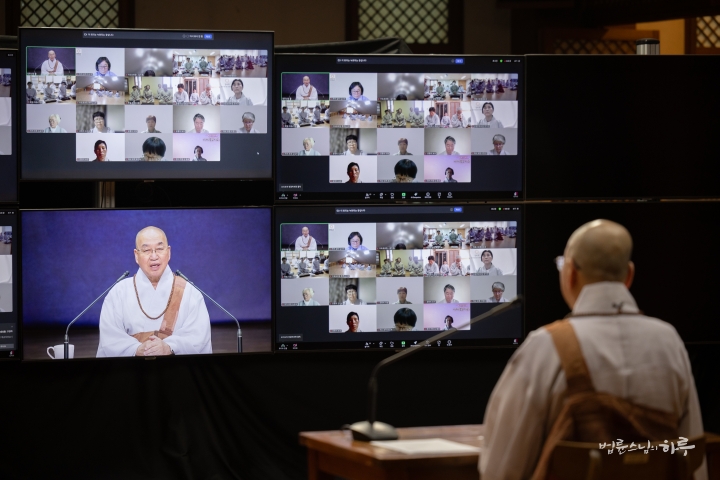
This is the mindset with which one should approach Jaja. When conducting Jaja, one must not have a discriminating mind, but rather have compassion for others.
‘That practitioner is excellent in every way, but they consistently violate this precept, which undermines trust. If this aspect improves, it would be good for that person and would help build trust among Sangha members.’
Only with such compassion and aspiration can one properly conduct Jaja. However, in reality, we hesitate to do Jaja because of our discriminating mind. We think things like: ‘They are senior to me, so am I qualified to speak?’, ‘What if I point this out and then get criticized myself later?’, ‘They must have had their reasons, let’s just let it go!’ However, this is not right. Based on the precepts, one should speak honestly and openly for the benefit of oneself and the Sangha. The listener should listen with gratitude and correct their mistakes. There is also an opportunity to clarify matters that differ from the facts. However, one must be careful not to use this opportunity for clarification as an excuse or self-defense, as this can become a source of division in the Sangha.
Most people unconsciously engage in self-defense. Just as we flee or fight when we feel physical threat or danger, our instinct to defend the ego activates when we receive criticism mentally. That’s why we tend to hide or are reluctant to reveal our faults, and when they are exposed, we make excuses to defend ourselves. This is not bad; it can be seen as the workings of a sentient being’s mind. Therefore, we must understand such minds in others. However, understanding does not mean we should remain in that state of mind. Practitioners must transcend such sentient minds. 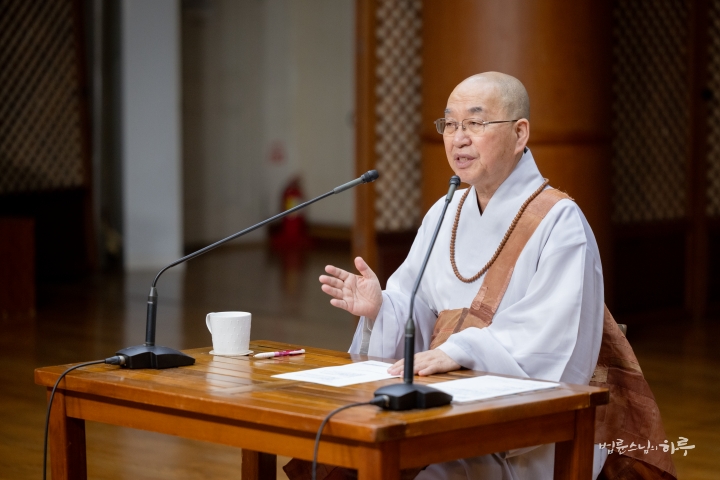
If we don’t practice Jaja, even when we become aware of our faults, it’s easy to overlook them thinking, ‘This much should be okay.’ When this repeats, the initial feeling of ‘I shouldn’t do this’ or ‘This goes against the precepts’ gradually dulls, and even our awareness of the problem can disappear, becoming chronic. Sometimes we don’t realize our own faults, and even when we do, we often let them pass without much concern. That’s why through Jaja, by receiving insights from fellow practitioners’ wisdom, we can clearly recognize the faults we’ve been habitually glossing over. If we approach Jaja with a worldly mind, it becomes an uncomfortable time, but if we approach it from a practice perspective, it becomes a joyful and grateful time. With this mindset, let’s begin today’s Jaja practice.”
Following this, the Gyeolsa Practitioners and Dharma Teachers repented according to the 40 precepts, and then each group member requested Jaja from their fellow group members.
“If you have any doubts from seeing and hearing my words and actions, or if there is anything you would like to say for my practice, I request Jaja for my benefit.”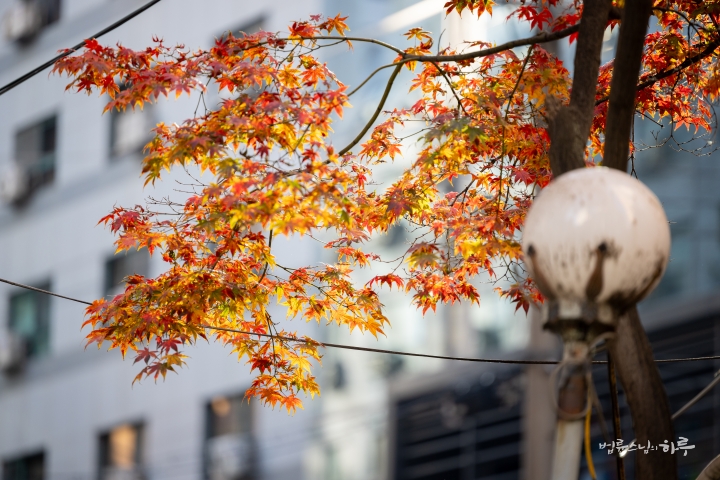
They continued with Jaja until 4 PM. After completing Jaja, everyone gathered again for a Dharma Q&A session with Sunim. First, Sunim encouraged the Gyeolsa Practitioners and Dharma Teachers who had completed Jaja.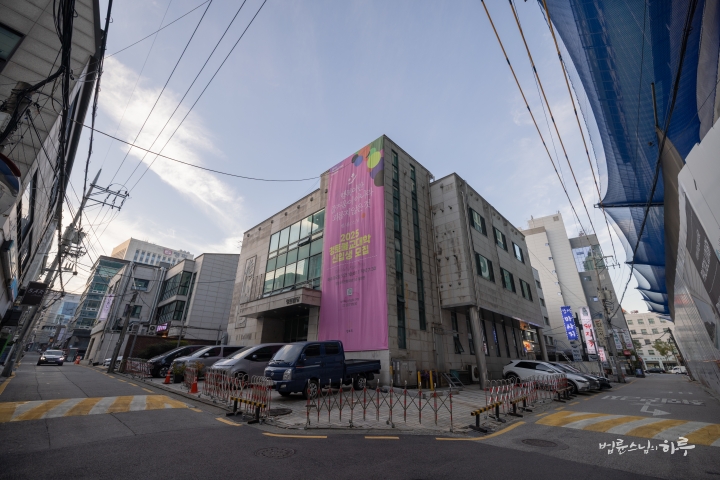
“We have successfully completed the 2025 Jungto Society Posal and Jaja ceremony. Through this, the Sangha of Jungto Society has attained purity. Let’s have a time for open dialogue about any questions that arose during the Posal and Jaja proceedings.” 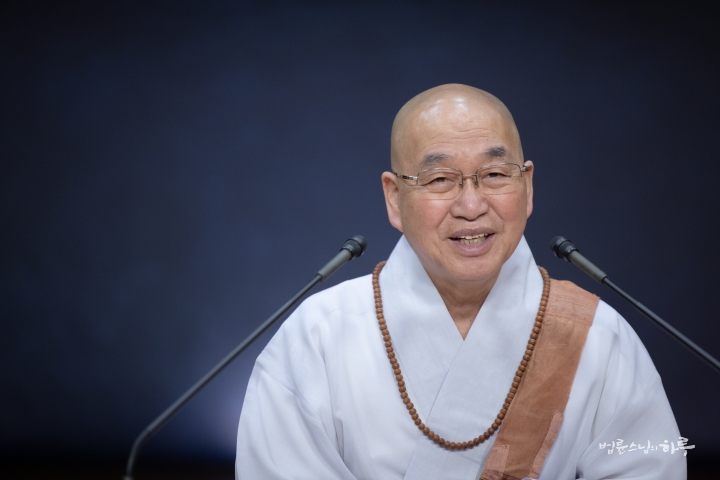
Following this, anyone could freely ask Sunim questions about any concerns that arose during the Jaja process. Various questions continued for an hour. Among them, one person shared their confusion about how to speak as a practitioner when navigating between giving advice and criticism.
Regarding the Precept About Not Teaching Others, Where Is the Line Between Criticism and Suggestion?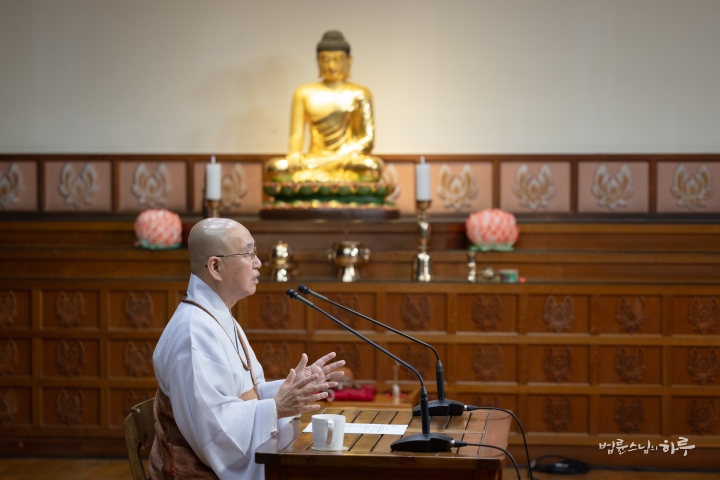
“Making suggestions cannot be called criticism. Since meditation should be done in a quiet place, suggesting that it would be good to move the booth if possible is a suggestion. Also, since the other person asked ‘How was it?’, you were simply giving your opinion when asked, so it can’t be seen as criticism. If you had taken the initiative to say ‘This should be done this way,’ it would be a bit ambiguous whether it’s a suggestion or criticism. It could be seen as either. Saying ‘This must be done this way’ can be seen as criticism, but saying something like ‘That side is noisy and this side is quiet, so it would be good to change the space arrangement next time’ is more of a suggestion.
‘This counts as guidance, and this is teaching others.’ We can’t make such clear-cut distinctions. It’s not easy for me to distinguish and speak accordingly, and it also depends on how the person receiving my words interprets them. I might think I was guiding, but the other person might feel I was teaching. Or I might think I was teaching with some discriminating mind, but the other person might readily accept it and think ‘I received good guidance.’ So we can’t divide this as precisely as cutting with a knife. There are slight differences depending on the circumstances.
As a Dharma Teacher, it’s better to play a guiding role whenever possible. When someone asks, ‘My husband is like this and that, and I can’t live with him anymore. What should I do?’ If you say, ‘You must unconditionally bow down and see your husband as Buddha and practice,’ that’s teaching. On the other hand, saying ‘It must be really hard for you with your husband being like that’ is listening and empathizing. After that, it would be good to say something like this:
‘I had a similar experience in the past. At first, I fought a lot, but after listening to Sunim’s Dharma talk, at a certain moment I gained awareness and changed my mind, and my heart became peaceful. As time passed, my husband changed a little too. In my experience, this is what happened.’ 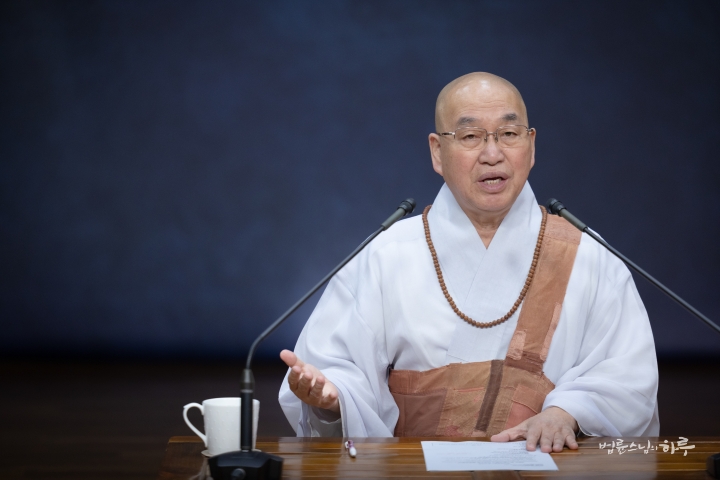
Then the other person might say, ‘I should try that too,’ and learning could occur. Or if they respond with ‘That’s your situation, but my husband could never be like that,’ then that’s fine too. This is what guiding means. There’s also another way to say it.
‘I don’t have much experience, so it’s hard for me to say anything specific, but I heard a similar story in Venerable Pomnyun Sunim’s Dharma Q&A last time. I’ll recommend it to you – maybe you’d like to listen to it.’
This kind of conversation also counts as guiding. On the other hand, saying something like this is teaching:
‘That’s because you have a strong ego. Treat your husband like the Buddha. Try praying like that.’
When having conversations, it’s easy for anyone to end up teaching others. Any standardized talk based on what you’ve read in books or heard from Sunim’s dharma talks counts as teaching others. However, saying things like ‘I saw this in the scriptures,’ or ‘Sunim said this during a Dharma Q&A’ – these all count as guiding. If you maintain a guiding perspective as much as possible, Dharma Teachers won’t feel burdened when counseling. It’s okay not to know everything. But if I try to teach others or intend to change them, when things don’t go as planned, I’ll feel self-deprecating thoughts like ‘Am I not capable?’ or ‘Am I not qualified to be a Dharma Teacher?’
So trying to teach others becomes a burden for them and for me. However, if you maintain the perspective of playing a guiding role, I feel comfortable, it helps the other person, and ultimately the educational effect increases. So when lightly suggesting opinions, you don’t need to worry about ‘Would this be interfering? Or not?’ Instead of commanding ‘Do this!’, you can say ‘When I did it before, I did it this way – what do you think about trying it as a reference?’ There’s no reason why fellow Jungto volunteers can’t share opinions with each other. Just don’t speak as if teaching subordinates, saying ‘Do this. Do that. That’s wrong.’ That’s what I mean.”
“Yes. I won’t lose sight of this perspective. Thank you.”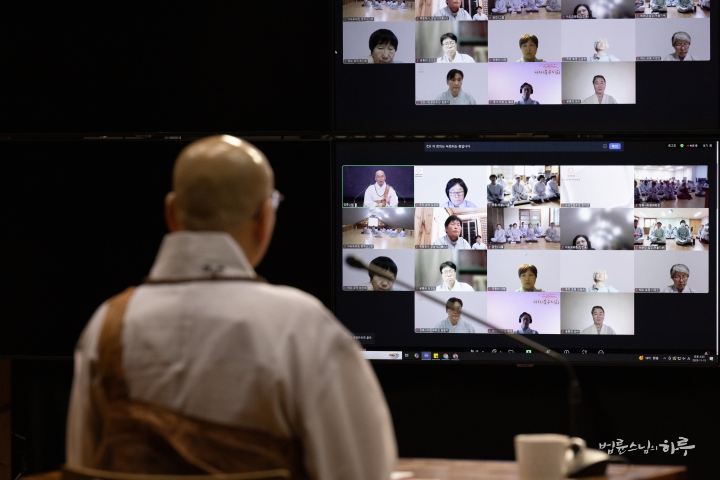
Questions continued to follow.
If I miss the Weekly Dharma Assembly during the Northeast Asian History Tour, does that count as breaking the precept of attending the Weekly Dharma Assembly once a week?
If I express opposition again at the next level meeting for a proposal that was already rejected despite sufficient discussion, is that a violation of precepts?
During Jaja, can we repeatedly emphasize the same point? When something has become a chronic habit for someone, I hesitate to point it out – how should we conduct Jaja in such cases?
When online meetings continue and I miss regular meal times, should this be subject to repentance?
Among Dharma Teacher candidates, if someone has a history of mental illness, how much of this information should be shared in meetings? It’s sensitive information – how much should we discuss?
During meditation, my unconscious is triggered causing convulsions and I end up removing clothes, making group practice burdensome. Should I still participate in group practice when I have these bodily reactions?
I think Dharma Teachers need a certain level of dress code even in everyday life. What would be an appropriate standard?
I sometimes feel uncomfortable with attitudes that excessively distinguish between the community and the Lay Member Group without flexibility. What mindset and attitude should I have in such situations?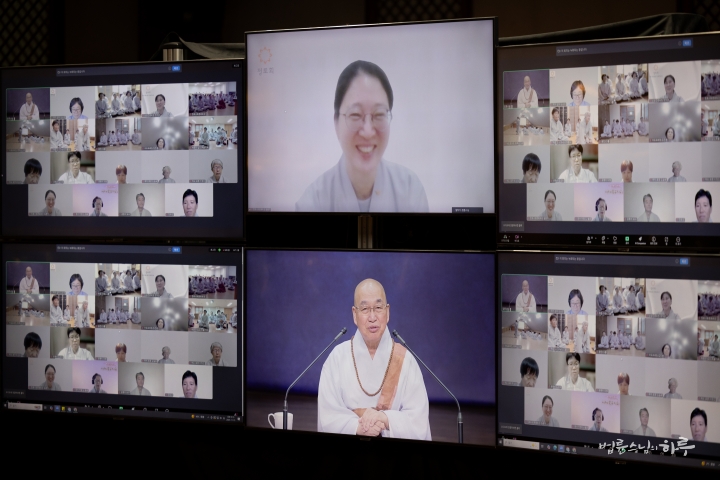
The last questioner asked Sunim for advice on how to speak when it seems like telling someone what to fix won’t be effective.
Ingrained Habits Are Hard to Change – How Should We Address Them?
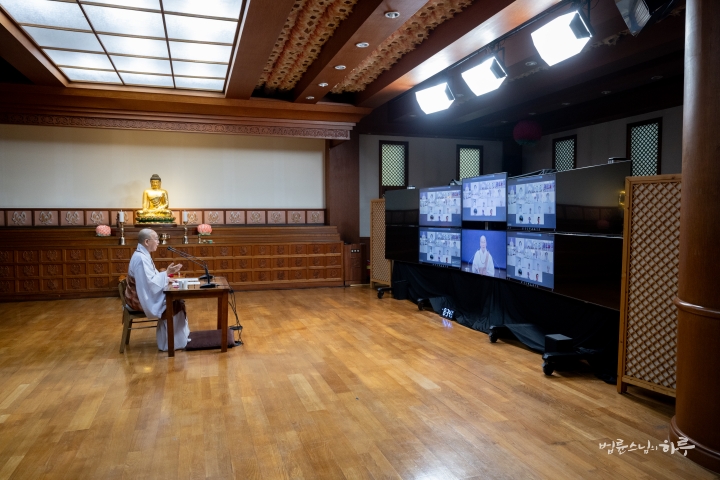
“Not everything gets fixed just because we do Jaja. If that were the case, we’d only need to do Jaja once and never need to do it again. Things might not change even with Jaja. However, when speaking, it’s not right to have the attitude of ‘I know you won’t change even if I say this, but I’ll say it anyway.’ In that case, it’s better not to say anything at all. Saying ‘You won’t listen even if I tell you’ while speaking is not respectful to the other person. If you feel that way, just don’t speak. There’s no need to add the premise of ‘I’ll tell you even though it seems like you won’t change.’ Whether they change or not is their responsibility. I’m just doing Jaja for their benefit. Saying ‘I don’t think you’ll change even if I tell you’ is me complaining, not helping the other person. It’s like during Dharma Q&A when people say ‘I shouldn’t say this to you, Sunim, but…’ If you think that, you shouldn’t speak. If you’re going to speak, just speak without adding such premises. Similarly, just say ‘That behavior goes against the precepts, so it would be good if you could change it.’ Whether it changes or not is their problem. Thinking that it won’t change even if I speak and saying so is interfering in the other person’s life. This kind of speaking is not ‘Jaja’ but rather my discomfort coming through in the conversation.”
“I understand well. Thank you.”
After finishing the dialogue, Sunim had another appointment immediately, so he hurried to the Jungto Social and Cultural Center without attending the closing ceremony. The Gyeolsa Practitioners and Dharma Teachers completed the closing ceremony and finished the entire Jaja retreat.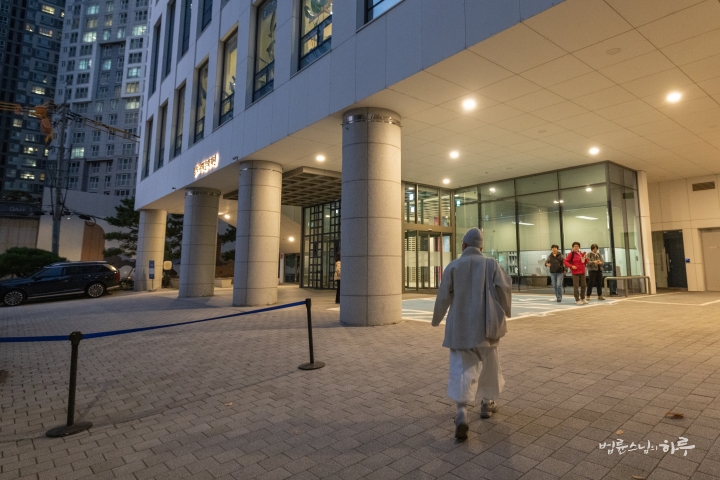
As the sun set, at 5:30 PM, the supporters who had prepared and conducted the Youth Festa gathered at the Jungto Social and Cultural Center for their disbanding ceremony. First, they had dinner together in the basement cafeteria. A simple dinner was prepared for the young volunteers who had worked hard preparing for the Youth Festa over the past three months.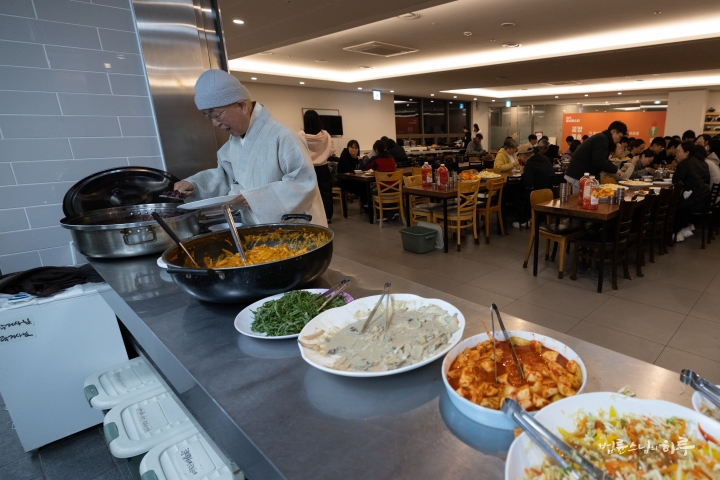
After having dinner together, they held a cake cutting ceremony to celebrate successfully completing the Youth Festa. The President of Jungto Society who oversaw the Youth Festa, the Special Youth Division Director, and the Youth Division Dharma Teachers all came forward. Seeing the cake with Avalokitesvara Bodhisattva drawn on it, Sunim laughed and said:
“How can we cut Avalokitesvara Bodhisattva?” (Laughter)
They cut the cake while avoiding Avalokitesvara Bodhisattva.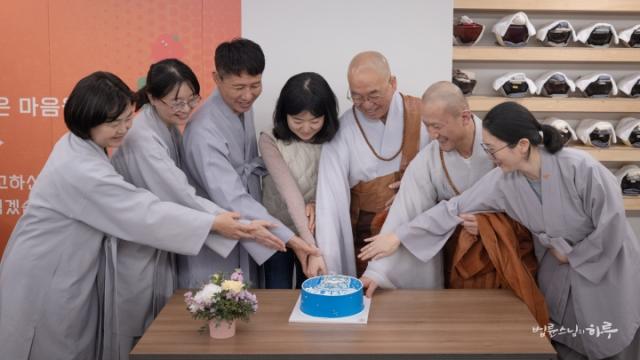
“One, two, three!”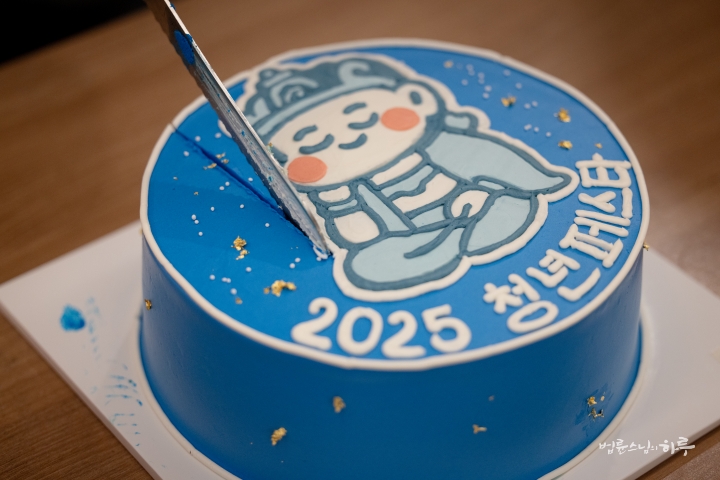
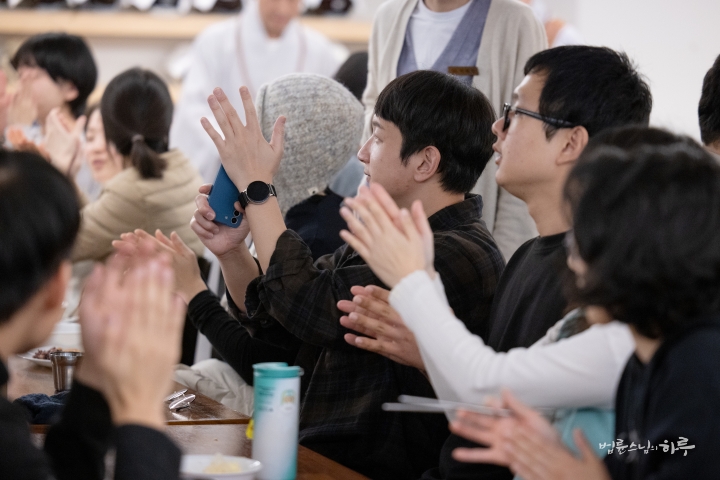
After cutting the cake, Sunim asked the young people: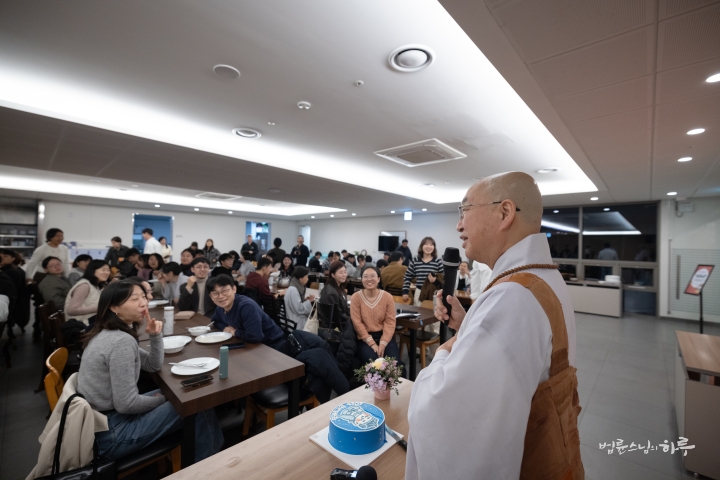
“Would you like to continue the Youth Festa in the future? Or was it so difficult that you’d like to do it just this once and stop?”
“We’d like to continue.”
“Those who would like to continue, please raise your hands.” 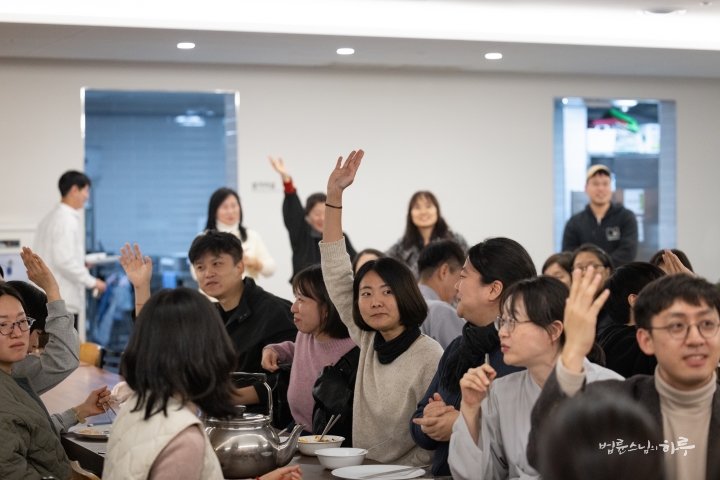
Most people raised their hands.
“Is it better to hold it at the Jungto Social and Cultural Center like this time? Or would it be better to hold it at a larger venue like Dongguk University? If we want more people to participate and make it socially meaningful, it would be better to hold it at Dongguk University. But if we want to create a focal point for participants to continue their connection with Jungto Society, it would be better to hold it at the Jungto Social and Cultural Center, even though the space is limited. There are pros and cons. Those who think it would be better to hold it at a larger venue, please raise your hands.”
Opinions were divided about the next venue for the Youth Festa.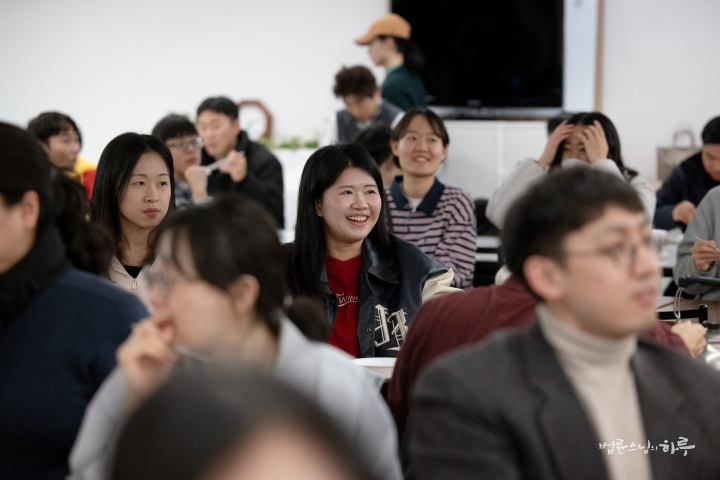
They decided to discuss it again later and all moved to the underground auditorium together.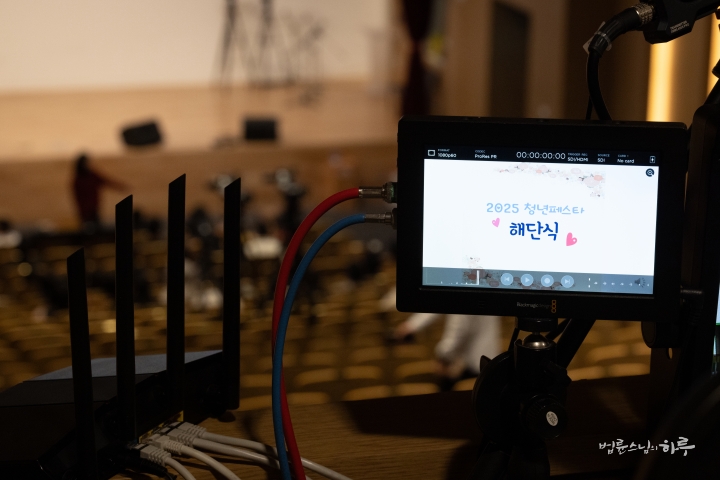
With about 100 young volunteers gathered, the Youth Festa Supporters’ disbanding ceremony began at 6:30 PM.
First, the Special Youth Division performed an opening celebration for the disbanding ceremony. When two people sang “It’s You” as a duet, originally sung by Sung Si-kyung and IU together, the venue immediately filled with a celebratory atmosphere.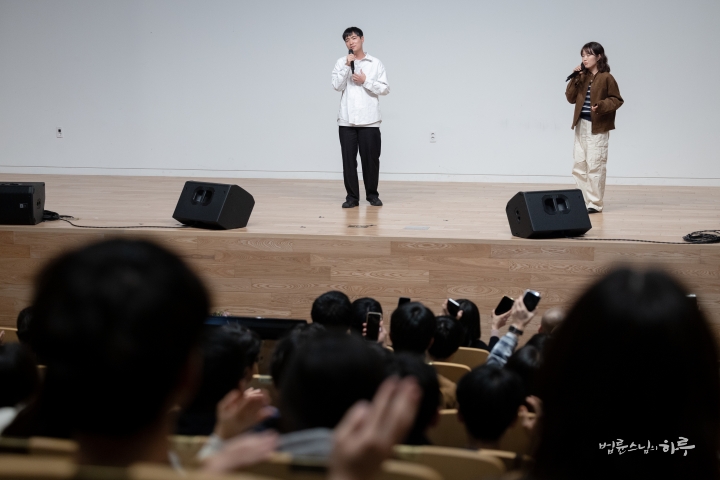
They then passionately sang “Blue Whale.” Like the lyrics about starting in a small pond but swimming like a whale, they wished for the Youth Festa to continue developing.
Someday we too will swim like blue whales ♬
May we live in this wide world without fear
May we be such people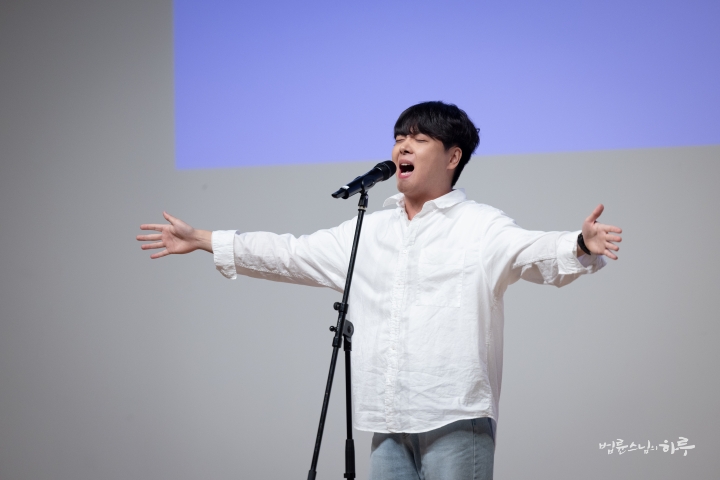
They sang together and encouraged each other with loud applause for their hard work.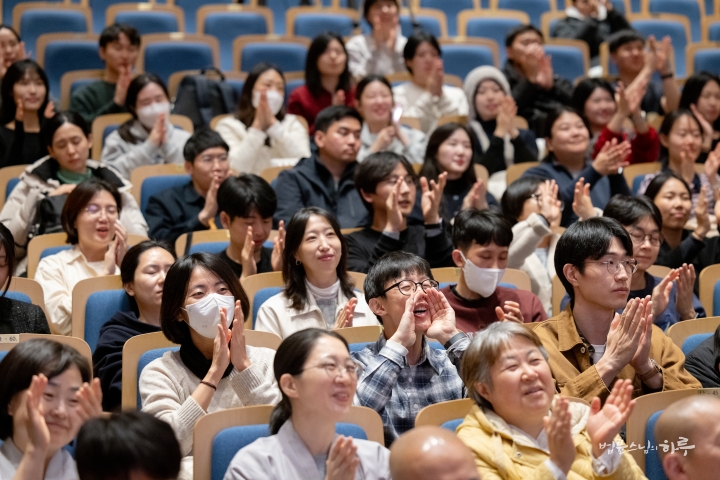
Next, they had time to hear reflections from the supporters about what they felt while conducting the Youth Festa. One person from each department – Lecture Department, Seminar Department, Booth Department, Promotion Department, Guide Department, Support Department – came forward and freely shared their thoughts.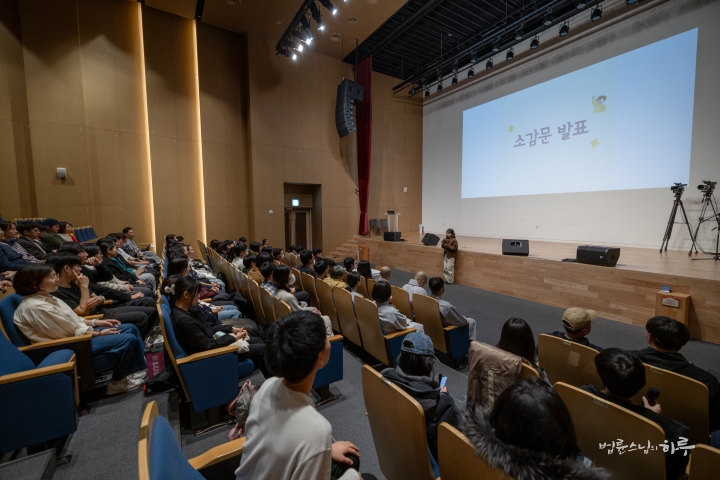
“At first, I couldn’t even hold a needle, but as I took on the sewing playground volunteer work, many afflictions arose. However, I realized again that this process was practice. By attending every practice session without missing, I was able to properly learn at least the basics. On the event day, I approached it with the mindset of ‘I’ll donate one million won every time discrimination arises,’ and praying like this, I was able to finish successfully. It was a time when I deeply felt that peace of mind and immersion are more valuable than the comfort that material things provide.”
“At first, I just wanted to enjoy as a participant, but seeing fellow practitioners preparing made me want to help create it too, so I took on various responsibilities. It was a whirlwind schedule, but as I did things one by one, I realized I had accomplished more than I thought. The sight of fellow practitioners doing their best in their respective roles gave me great strength, and the fact that we prepared together remained as reassurance. Thanks to this Youth Festa, it was a time when I fully experienced new experiences and joy.”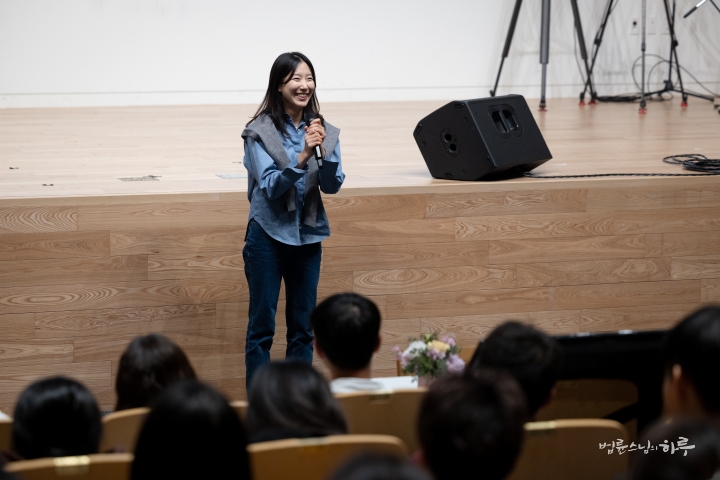
“I developed and operated the entire system so participants could use it comfortably – homepage, check-in, seat assignment, etc. Since I was connected with various departments, there was a lot of communication, and seeing the entire event made me want it to succeed even more. There were many shortcomings, but as I fulfilled my responsibilities wholeheartedly, meaningful changes remained within me too. I’m grateful that we accomplished this big event together with many fellow practitioners, and it was a time of much learning.”
“The seminar team had no foundation at all, but it felt even more attractive because it was like a blank canvas. There were many constraints and frustrations, but conducting 31 sessions over 3 days, I felt the joy of creating something from nothing. Working with team members I liked made me so happy that I thought we were already ‘successful people.’ I learned that young people want to open their hearts and connect, and I developed a wish to expand such opportunities.”
“While filming throughout the event and seeing the vibrant appearance of young people, I realized I had been viewing the word ‘youth’ too heavily. I was grateful thinking that young people could enjoy themselves here freely because there were people volunteering quietly in unseen places. Through this event, I felt the sincerity and warmth of many people, and I felt both embarrassed and grateful.”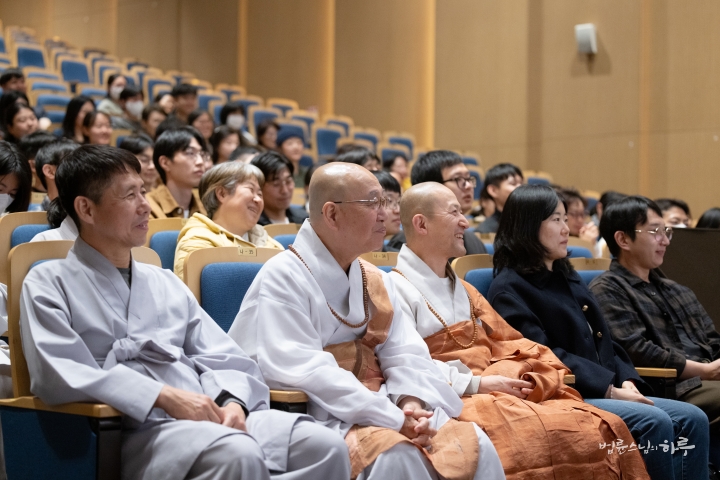
The last young person who stood before everyone was shy and repeated what they had said several times, continuing their reflection that seemed to break off and reconnect.
“Throughout the event, I blamed myself a lot thinking ‘I’m not doing much, I’m not being properly utilized.’ Then when I went to eat and saw the deliciously prepared meal, I was so grateful for the fellow practitioners’ efforts, but also thought ‘I’m not even earning my keep.’ I was so troubled that I even thought about making a donation. So I kept reflecting on my mind while practicing, and I’m sorry I didn’t prepare enough today either. Then when we were organizing items after the event ended… how should I say this… Still, I’m grateful I could be together like this.”
Sunim listened attentively to the young volunteers’ reflections and gave big applause after each person finished their presentation.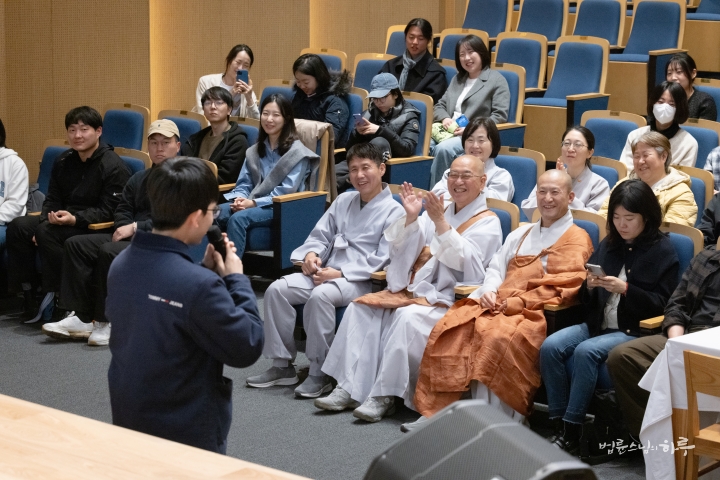
The young volunteers were able to look back on the meaningful time they had created while listening to their fellow practitioners’ presentations.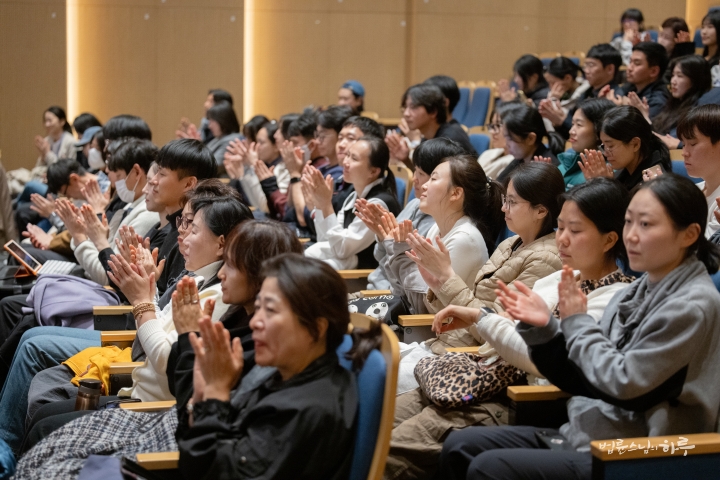
Next, the young volunteers asked Sunim for a dharma talk to conclude the disbanding ceremony. Sunim emphasized that we must deeply reflect on what we learned and what assets we gained through this Youth Festa.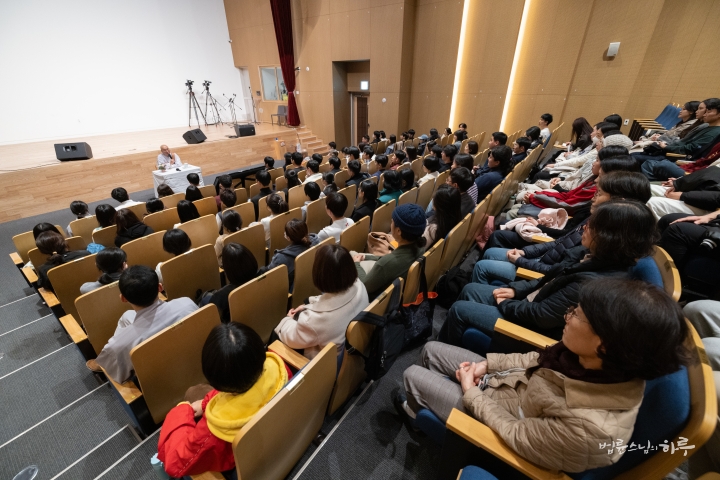
“I’ve listened carefully to all your reflections. It’s even more wonderful to see you all in person like this. While preparing for this Youth Festival, we publicly introduced it as ‘an event organized to give hope to young people in Korea.’ With this goal in mind, the young volunteers of Jungto Society planned and gained experience in bringing their ideas to life. Now, a natural question remains: ‘What have we gained from this experience?’
In general society, the success or failure of a major event is usually evaluated by economic criteria. The standard is based on how much effort was invested and how much profit was generated. However, this Youth Festival was neither funded by investment nor did it charge participants any fees. There was no possibility of financial profit or loss. Therefore, it’s difficult to evaluate the success of this event in monetary terms. We could also set a criterion of ‘How many people did we help?’ We could evaluate it by saying, ‘About 3,000 people participated, and most of them enjoyed it and were satisfied.’ But even this remains somewhat abstract. So what criteria should we use to evaluate this event? 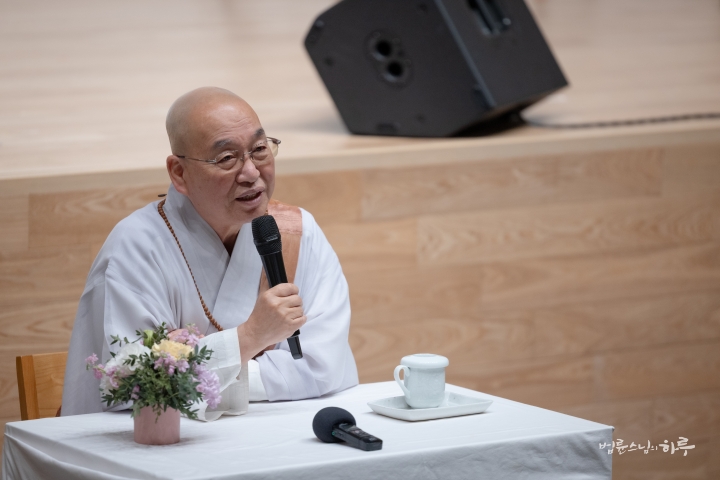
Now that the Youth Festival is over, what are the real assets that remain with us?
First, the experience of directly planning and implementing the Youth Festival will have remained as a significant asset. Although it was challenging, you gained new experiences. To use a mountain climbing analogy, it’s like having the experience of ‘enduring hardship while climbing a mountain.’ Just as you might feel, ‘So mountain climbing builds physical strength,’ or ‘This time I crossed streams and climbed steep paths,’ such experiences are remembered for a long time. In other words, just as you save profits, this event has accumulated the asset of ‘experience.’ All the work you physically engaged in—preparing meals, managing the organization, producing event materials—will have become valuable resources for you.
Second, the deep ‘experience with people’ gained from working with fellow practitioners is also a significant asset. While you usually just exchange greetings and practice together, you can only truly understand a person’s thoughts, personality, strengths and weaknesses by working together. When you go through hardships together, both positive and negative aspects of a person are revealed. As mentioned in the reflections, ‘I worked with good people,’ the fastest way to know what kind of person someone is, is to work with them. Through this event, you experienced people and went through various processes of building relationships with others. 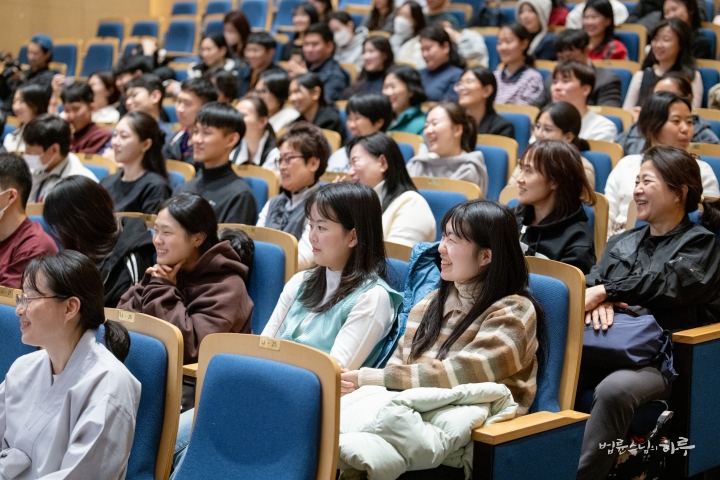
The same applies to dating. Usually, people rarely have opportunities to meet the opposite sex, and even on blind dates, both parties feel awkward. There’s not much to talk about besides eating and having coffee. However, when working together toward a common goal like this event, each person’s personality and strengths and weaknesses naturally reveal themselves. You find yourself drawn to some people while clashing with others. But whether you feel ‘good or bad’ isn’t important. What matters is the experience itself – ‘I’ve experienced working with various people’ and ‘I’ve had the experience of adapting to others.’
To work together, you have no choice but to adapt to others. People who gather without a common goal can simply leave when conflicts arise, but for this Youth Festival, even though no one was paid, most of you probably stayed until the end. Leaving midway would affect not just your relationship with one person but potentially your connection with Jungto Society as well. To put it bluntly, some of you may have found it difficult to leave because you were worried about ‘being marked’ by other Jungto Society members. However, there were probably also those who stayed and eventually had a change of heart.
Marriage is similar. When couples don’t get along, they may want to separate, but thinking about their children, parents, or the people who attended their wedding helps them get through difficult times. As they persevere, what once seemed like major issues can later feel insignificant. You probably had similar experiences while preparing for this event. Some of you may have persevered thinking, ‘It’s only a few more months until this ends, so let’s just stick together until then.’ If this had been a 30-year project, many would have left midway. This ‘process of persevering’ is also a very valuable experience for you.
Third, this experience will remain as a ‘memory’ for you. There are various types of memories. Some were fun at the time but fade over time, some become regrets, and some were difficult but bring a smile when recalled. The hardships from this event will likely become good memories later, with you saying, ‘We really went through a lot back then.’ Since this was voluntary work rather than forced labor, most of it will become good memories.
While pleasure or money may seem important in the moment, as time passes, money comes and goes, and pleasure disappears like a mirage after lingering briefly. However, a sense of fulfillment lasts long. I believe there’s a high probability that you’ll look back on this experience and think, ‘Investing my time in that work was truly a good choice.’ 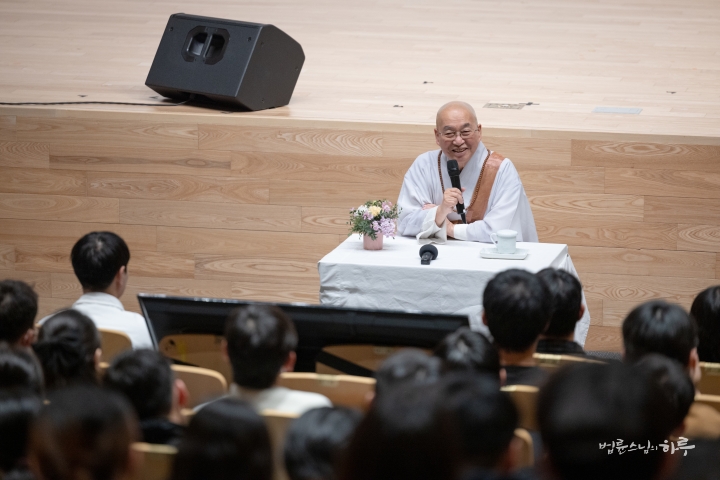
Over the past 30 years of working with fellow practitioners, I have often asked myself, ‘What ultimately remains for us?’ Can we truly measure success by the growing number of Jungto Society members or the increasing number of buildings? As membership grows, the time we spend talking with each other actually decreases because there’s more work to do. Sometimes I feel more nostalgic for the days when we had no facilities at Mungyeong Jungto Retreat Center, when we built the retreat center and living quarters with pickaxes in hand.
Material standards are like eating food and producing excrement. What is the final product after we diligently cook, eat, and digest? It’s excrement. In life, being attached to outcomes is like being attached to excrement. True fulfillment is already gained while living through the process. Yet we obsess over life’s residue—’status, wealth, honor’—these outcomes that are like excrement, and judge success and failure by them.
When an artist came to me for counseling after losing all their artwork from 20 years to a flood, deeply shocked, I said, ‘Why are you so attached to excrement?’ Artwork is ultimately just another outcome. Life’s meaning is already realized within the process. Yet we suffer by measuring success and failure by the color and size of life’s excrement—its outcomes.
The same applies to Jungto Society. Whether we have a thousand or ten thousand members in the future, what matters is not the scale but the process. The early days of Jungto Society, when I gave Dharma talks to five people in a 15-pyeong building, might have been more meaningful. Today’s Dharma Teachers all went through those hardships and conflicts together back then, which is why now they don’t complain no matter what task they’re given, don’t feel slighted when given less work, rest when they’re sick, and respect others when they rest. This is because they’ve already gone through 30 years of the process of discernment. This is precisely the process of practice. 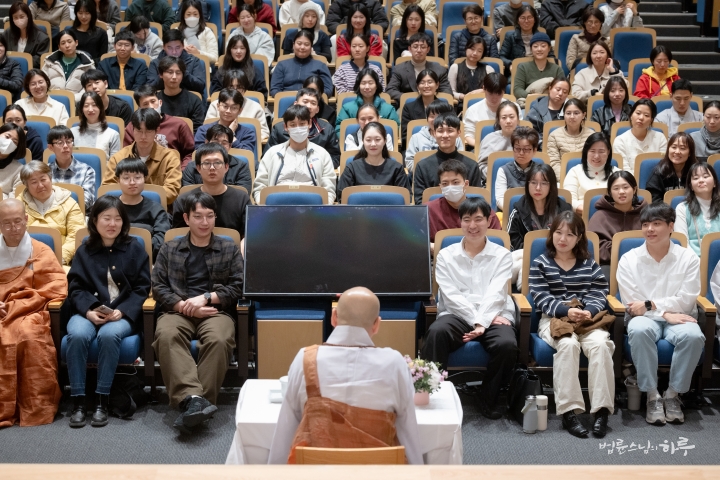
Why Now Is the Best Time
That’s why now is the best time for you too. It’s a good time even if you’re inexperienced. Because it’s your first time, you can draw freely on a blank canvas. Others might judge you as clumsy, but their evaluation isn’t what matters. We grow through experiencing this process. If we were to evaluate how successful this Youth Festival was, the real criteria would be: ‘How much experience did you gain?’, ‘Did that experience become meaningful and memorable for you?’, ‘Did you gain confidence that you too can accomplish such things?’ These are the true measures.
When you repeat experiences, your skills naturally improve. The same goes for presentations. Even if you stumble a bit, after doing it three or four times, you’ll get much better. If you shrink back, you won’t improve. Whatever it is, after repeating it a few times, you eventually become familiar and skilled at it. I hope that through these various experiences, you’ll grow into people who can manage a company or even run a country. 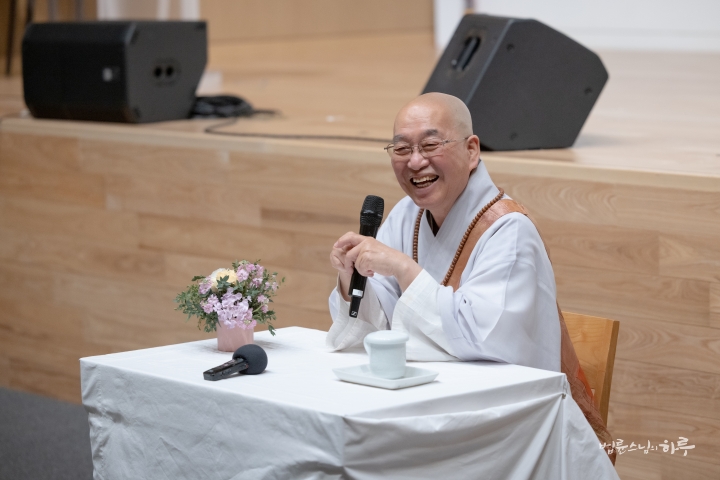
The cells in our body aren’t differentiated into eye or ear cells from the beginning either. As a single cell divides roles and repeats functions, it becomes an eye or an ear. Stem cells are cells before their roles are determined. You are exactly like those stem cells. Since your roles aren’t specified yet, you can become anything. When you take on this role in society, you develop these abilities; when you take on another role, you develop different abilities. What’s more important than innate talent is experience. Anyone can become an expert by doing.
The Youth Festival will become a new movement in our society. It’s neither a political movement nor an economic activity, but a cultural movement. It’s a new type of social movement that consumes less and operates through volunteerism. It can be the starting point of a new cultural movement different from past resistance movements. I hope we continue to try various things together and create a new culture.
We’re in a transitional period now. You need new clothes that fit you. The clothes made by your seniors don’t fit today’s youth well. The older generation doesn’t understand young people today, and young people aren’t interested in the older generation’s ways. A new way of activity that fits the younger generation hasn’t been created yet. We can see this as a kind of transitional period. That’s why you need to try on various things yourselves and create ‘clothes that fit your body.’ The Youth Festival is exactly that process. I hope we can build that foundation together. Everyone, you really did a great job. We had a great time!” 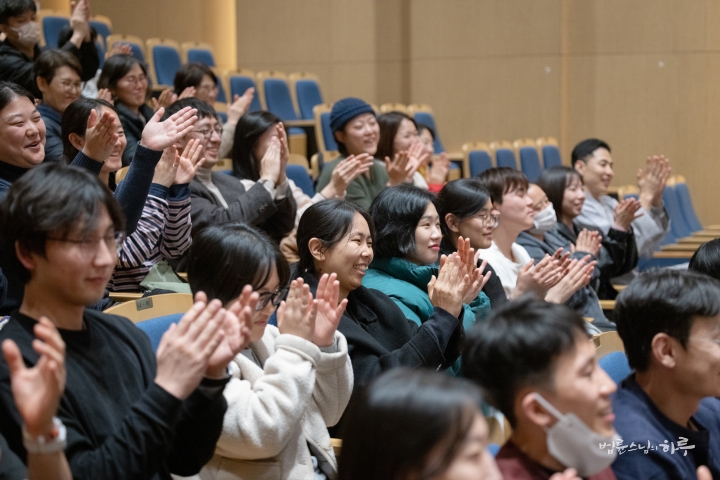
After finishing the Dharma talk, Sunim passed the microphone to Venerable Yusu, who had supported the young volunteers in various ways behind the scenes. Venerable Yusu also expressed great joy about today’s closing ceremony and shared his thoughts.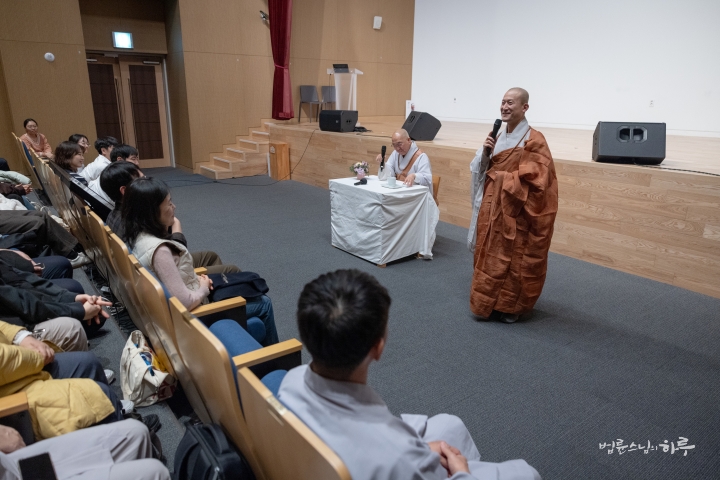
“I was truly happy and delighted to organize this major event with our young people. Above all, I’m even more pleased to see that the youth are saying ‘It was great, I want to do it again’ rather than ‘It was hard.’ It seems the Youth Festa has instilled great confidence in all of you. I hope this experience becomes an asset for bringing dreams and hope to young people in Korea and around the world.”
Next, Dharma Teacher Hyanghwa, who is in charge of the Special Youth Division, shared her thoughts.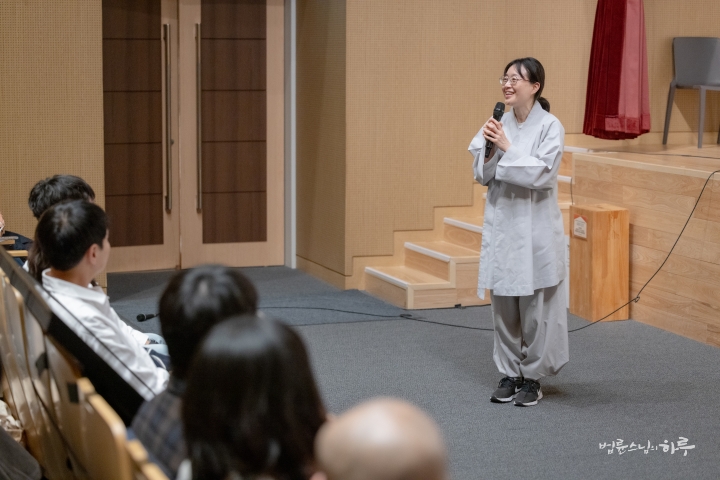
“It was truly wonderful to be with all of you. Your bright smiles before, during, and after the event brought great warmth to my heart. Even though some of you said you were so exhausted that you wouldn’t come back to Jungto Society after the event, I’m even more grateful that everyone came today. You all worked so hard.”
Finally, Park Soo-jung, the division leader who oversaw the Youth Festa, shared her thoughts.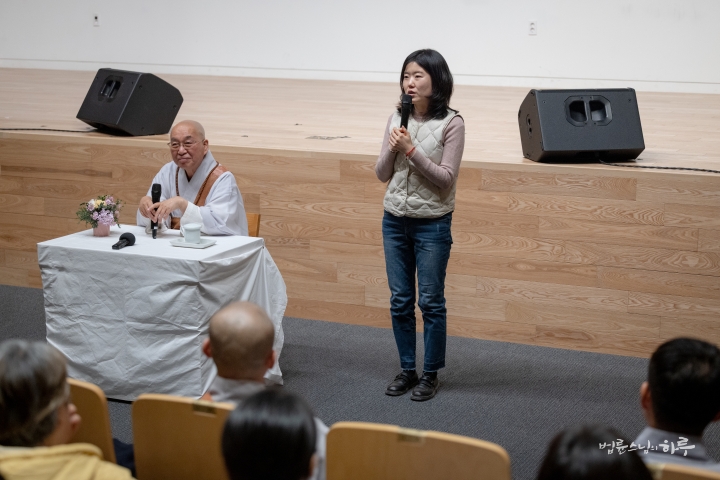
“I feel deeply grateful to all my fellow practitioners. There were many moments when I didn’t want to continue, felt angry, and thought ‘Please don’t look for me!’ But the reason we can laugh together in the end is because you all persevered with camaraderie. As this Youth Festa has become the pinnacle of our activities, there must be much that remains in your hearts. I hope next year we can take on even bigger roles and work with even more young people from around the world. Everyone did a great job.”
As the closing ceremony was wrapping up, Sunim called back to the front the young volunteer who had struggled to speak coherently during the earlier testimonial.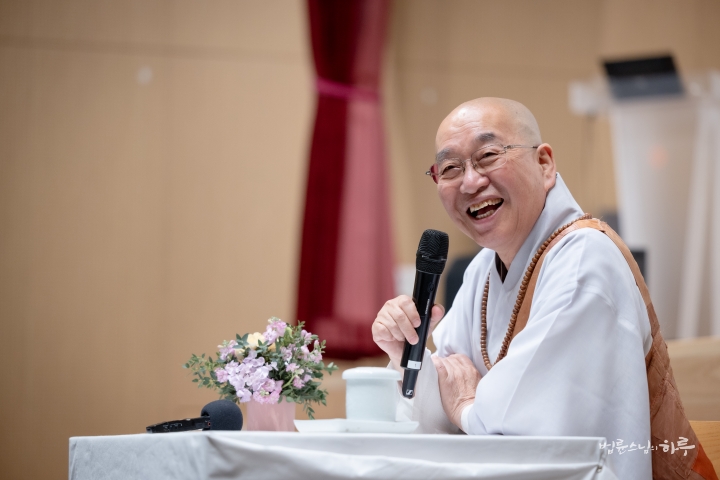
“You couldn’t speak properly earlier, but this time try to share your thoughts coherently within one minute.”
Standing before everyone again, the young volunteer shared his thoughts coherently within one minute. Everyone gave him a big round of applause. Sunim once again warmly encouraged the young volunteer.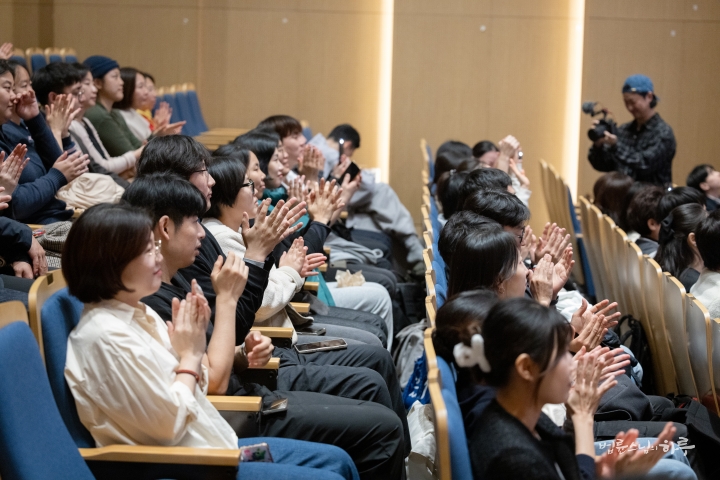
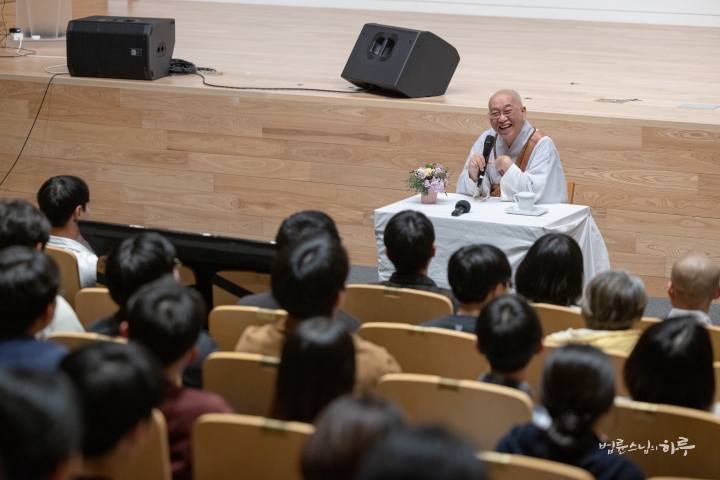
“That’s right. Well done. You need to keep practicing. Don’t back down just because you can’t do it well. Try speaking even if you stutter, try speaking briefly, try speaking at length – with practice, you’ll gradually improve. What’s so difficult about life? Squirrels live, rabbits live – why can’t humans live? Squirrels and rabbits even live in the forest. If small animals can live well in the forest, why can’t you all live well in human society? Once you establish this perspective, life isn’t that difficult. If it doesn’t work out, try again. Practice like this and you’ll be fine. You’re still young, so let’s build together while practicing.”
The Youth Festa closing ceremony concluded with the Four Great Vows.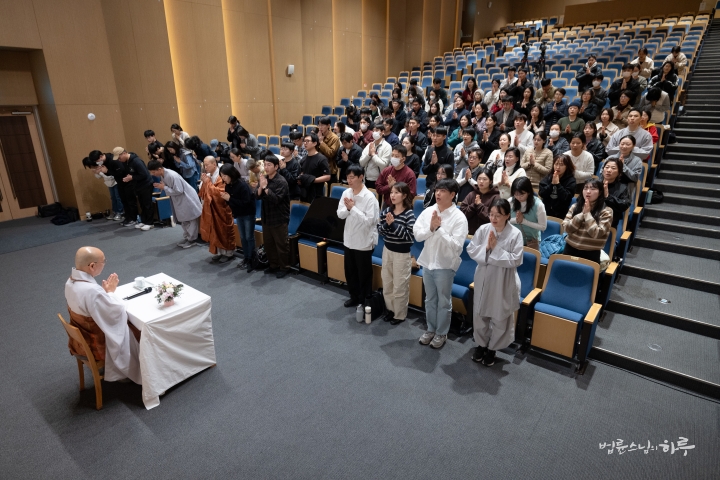
Finally, everyone took a commemorative photo together.
“We all had a great time!”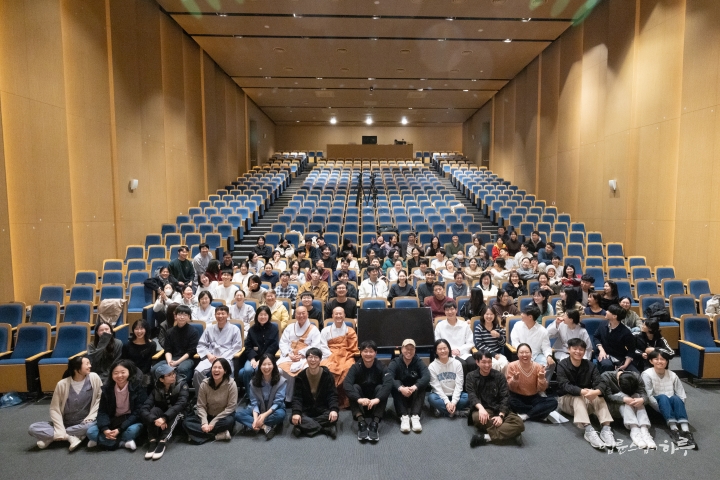
The Youth Festa concluded with a loud cheer. Everyone truly had a wonderful, exciting time.
The youth supporters gathered in groups for mindful sharing sessions, and after encouraging the youth supporters, Sunim returned to the Jungto Center to conclude the day’s activities.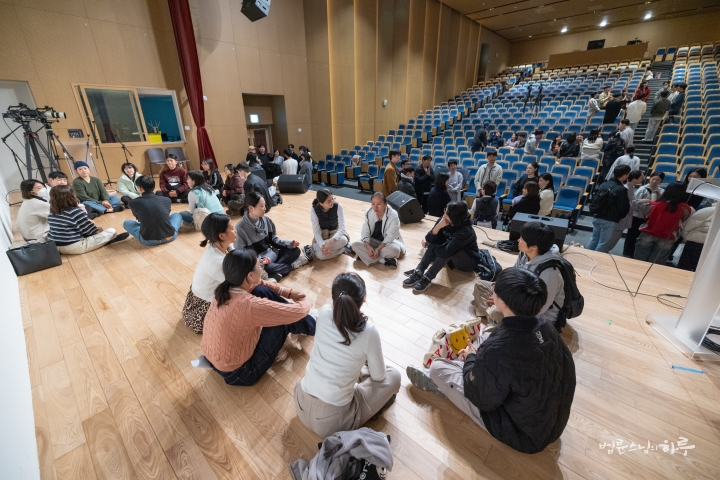
Tomorrow morning, Sunim will have an online Dharma Q&A session with Jungto Dhamma School students who are taking the “Human Buddha” course. He will then attend the Happiness Movement Special Headquarters event all day for discussions. In the evening, he will travel to Gimpo Airport and fly to Jeju Island for tomorrow’s lecture in Jeju.





